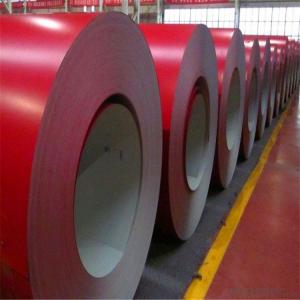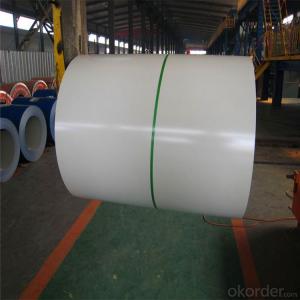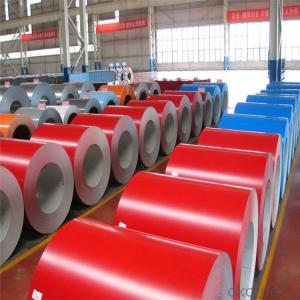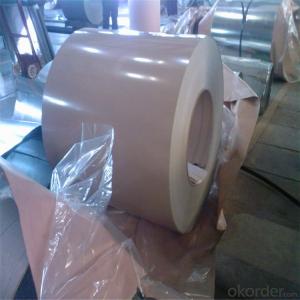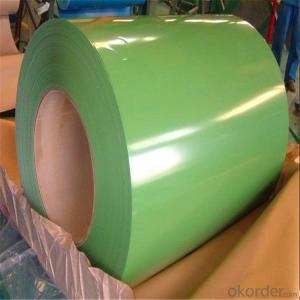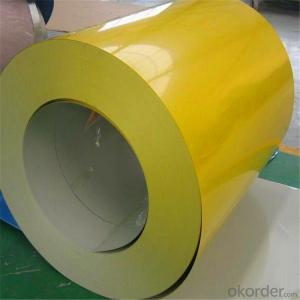Color Coated Steel Coil Printed PPGI for Building
- Loading Port:
- Tianjin
- Payment Terms:
- TT or LC
- Min Order Qty:
- 25 m.t.
- Supply Capability:
- 5000 m.t./month
OKorder Service Pledge
OKorder Financial Service
You Might Also Like
Item specifice
Color Coated Steel Coil Printed PPGI
Description of Color Coated Steel Coil Printed PPGI
Product | PPGI/PPGL |
Capacity | 5,000 tons/month |
Base material | Hot dipped galvanized steel |
Thickness | 0.2-2.0mm |
Width | 600-1250mm(according to your need) |
Coil Weight | 3-6tons |
Quality | SGCC, DX51D |
Color | RAL No. or customers samples’ color |
Zinc-coating | 30g/m2-180g/m2 |
Coil ID | 508mm/610mm |
Technique | Cold rolled—hot dipped galvanized—color coated |
Painting | Top painting:15~25μm |
Back painting: 6~10μm | |
Tolerance | Thickness: +/-0.02mm |
Width:+/-2mm | |
Shipment time | within 15-45 workdays |
Payment | T/T, L/C at sight |
Packing | Standard export packing |
The special order can be negotiated. | |
Application of Color Coated Steel Coil Printed PPGI
APPLICATION OF OUR PREPAINTED STEEL | ||||||||||
Construction | Outside | Workshop,agricultural warehouse,residential precast unit | ||||||||
corrugated roof,roller shutter door,rainwater drainage pipe,retailer booth | ||||||||||
Inside | Door,doorcase,light steel roof stucture,folding screen,elevator,stairway,ven gutter,Construction Wall | |||||||||
Electrical applicance | Refrigerator,washer,switch cabnet,instrument cabinet,air conditioning,micro-wave owen,bread maker | |||||||||
Fuiniture | Central heating slice,lampshade,chifforobe,desk,bed,locker,bookself | |||||||||
Carrying trade | Exterior decoration of auto and train,clapboard,container,isolation lairage,isolation board | |||||||||
Qthers | Writing panel,garbagecan,billboard,timekeeper,typewriter,instrument panel,weight sensor,photographic equipment | |||||||||
Products Show of Color Coated Steel Coil Printed PPGI

Product Advantages
1.With nearly 20 years experience in prepainted steel, accommodate different marketdemands. | ||||||||||||||
2.'Quality first, service first' is our business aim; 'The good faith get respect,cast quality market' is our Business philosophy . | ||||||||||||||
3.Having two series producttion line,with the abbual production capacity of 240000 tons. | ||||||||||||||
4.Exceed International ISO9001:2008&ISO14001:2004 quality and environmental standards | ||||||||||||||
5.Meet with ROHS standard |
Company Information
CNBM International Corporation is the most important trading platform of CNBM group.
Whith its advantages, CNBM International are mainly concentrate on Cement, Glass, Iron and Steel, Ceramics industries and devotes herself for supplying high qulity series of refractories as well as technical consultancies and logistics solutions.


F A Q
1, Your advantages?
professional products inquiry, products knowledge train (for agents), smooth goods delivery, excellent customer solution proposale
2, Test & Certificate?
SGS test is available, customer inspection before shipping is welcome, third party inspection is no problem
3, Factory or Trading Company?
CNBM is a trading company but we have so many protocol factories and CNBM works as a trading department of these factories. Also CNBM is the holding company of many factories.
4, Payment Terms?
30% TT as deposit and 70% before delivery.
Irrevocable L/C at sight.
5, Trading Terms?
EXW, FOB, CIF, FFR, CNF
6, After-sale Service?
CNBM provides the services and support you need for every step of our cooperation. We're the business partner you can trust.
For any problem, please kindly contact us at any your convenient time.
We'll reply you in our first priority within 24 hours.
- Q:What are the main applications of special steel in the chemical processing industry?
- Special steel is widely used in the chemical processing industry due to its exceptional properties such as corrosion resistance, high strength, and heat resistance. It finds applications in various components and equipment such as reactors, heat exchangers, pipes, valves, and fittings. These materials are crucial for handling corrosive chemicals, withstanding high temperatures and pressures, and ensuring the integrity and safety of chemical processing operations.
- Q:What are the common challenges in heat treatment of special steel?
- To achieve the desired material properties, careful attention must be given to several challenges encountered in the heat treatment of special steel. One primary challenge revolves around the necessity for meticulous temperature control throughout the heating and cooling stages. Special steels typically have specific temperature ranges for heat treatment that must be strictly adhered to in order to attain the desired microstructure and mechanical properties. Failing to maintain precise temperature control can result in inadequate or inconsistent heat treatment, ultimately leading to suboptimal material performance. Another challenge lies in the potential distortion or warping of the steel components during the heat treatment process. Special steels often possess intricate designs or complex shapes, making them more susceptible to distortion when subjected to high temperatures. This distortion can have adverse effects on the overall quality and dimensional accuracy of the final product. Consequently, careful consideration must be given to the selection of suitable heating and cooling methods, as well as the utilization of fixtures or jigs to minimize distortion. Moreover, special steels may contain alloying elements that significantly influence the heat treatment process. Elements like chromium, molybdenum, or vanadium can alter the steel's hardenability, tempering response, or transformation behavior. Their presence can introduce additional challenges when determining the optimal heat treatment parameters, necessitating adjustments to heating and cooling rates, soak times, or quenching media. Lastly, achieving uniformity in heat treatment across a batch of special steel components can prove to be challenging. Variations in size, shape, or composition within a batch can result in inconsistent heat treatment outcomes. Controlling the heating and cooling rates, ensuring proper circulation of the heat treatment media, and implementing effective process monitoring techniques are essential in achieving consistent and uniform material properties. In conclusion, the heat treatment of special steel encompasses challenges such as precise temperature control, distortion/warping, the influence of alloying elements, and achieving uniformity across a batch. Successfully addressing these challenges requires a comprehensive understanding of the steel's composition, meticulous process planning, and the utilization of appropriate process controls and monitoring techniques.
- Q:How does special steel contribute to the power generation industry?
- Special steel plays a crucial role in the power generation industry by providing the necessary strength, durability, and resistance to extreme temperatures and corrosive environments. It is used in the construction of turbines, generators, and other critical components, ensuring the efficient and reliable operation of power plants. Additionally, special steel's high heat resistance and excellent mechanical properties enable power plants to operate at higher temperatures, increasing energy efficiency and reducing emissions.
- Q:What are the advancements and trends in the field of special steel?
- In recent years, the field of special steel has witnessed significant advancements and emerging trends that have revolutionized various industries. These advancements can be primarily attributed to the growing demand for high-performance materials in critical applications, such as aerospace, automotive, energy, and construction. One of the major advancements in the field of special steel is the development of advanced manufacturing techniques. Traditional steel production methods have been replaced by more efficient processes like electric arc furnaces and vacuum induction melting, resulting in improved steel quality and enhanced mechanical properties. These advancements have facilitated the production of special steels with superior strength, corrosion resistance, and heat resistance. Another significant trend in the field of special steel is the emergence of new alloy compositions. Researchers and manufacturers are continuously exploring and developing novel alloying elements to enhance the properties of special steels. For instance, the addition of elements like chromium, molybdenum, and vanadium has led to the development of stainless steels with exceptional resistance to corrosion and oxidation. Furthermore, the field of special steel has also witnessed advancements in heat treatment processes. By employing advanced heat treatment techniques like quenching and tempering, austempering, and martempering, special steels can achieve desired hardness, toughness, and dimensional stability. These advancements have significantly expanded the application range of special steels, allowing them to be used in critical components that operate under extreme conditions. In addition to advancements in manufacturing and alloy compositions, there is a growing trend towards the development of environmentally friendly special steels. With increasing concerns about sustainability and carbon footprint, researchers and manufacturers are focusing on reducing the environmental impact of steel production. This has led to the development of special steels with lower carbon content, as well as the implementation of energy-efficient manufacturing processes. Moreover, the field of special steel is witnessing the integration of digital technologies and automation. The use of artificial intelligence, machine learning, and data analytics is enabling manufacturers to optimize production processes, improve quality control, and reduce costs. This trend towards Industry 4.0 is transforming the way special steel is produced and utilized, ensuring greater efficiency and precision in the manufacturing process. In conclusion, the field of special steel is experiencing significant advancements and trends that are driving innovation in various industries. The development of advanced manufacturing techniques, new alloy compositions, improved heat treatment processes, environmentally friendly production methods, and the integration of digital technologies are revolutionizing the properties and applications of special steel. These advancements have not only enhanced the performance and durability of special steel but also opened up new possibilities for its utilization in critical applications.
- Q:Is special steel resistant to chemical corrosion?
- Special steel, which is also known as stainless steel, is typically resistant to chemical corrosion. It is an alloy that contains at least 10.5% chromium. The presence of chromium in the steel forms a protective layer on the surface, preventing corrosion. This layer is stable and shields the steel from reacting with chemicals and corrosive substances. Furthermore, special steel may contain other elements like nickel, molybdenum, and titanium. These elements enhance its resistance to chemical corrosion, enabling the steel to withstand exposure to acids, alkalis, salts, and other corrosive agents commonly found in industrial and environmental settings. Nevertheless, it is important to consider that the resistance of special steel to chemical corrosion can vary based on its grade and composition. Different grades of stainless steel offer different levels of corrosion resistance. Therefore, it is crucial to select the appropriate grade depending on the intended application and the specific corrosive environment. To summarize, although special steel generally resists chemical corrosion, the level of resistance can differ depending on the grade and composition. Hence, it is essential to assess specific requirements and seek advice from experts to choose the most suitable special steel for a particular application.
- Q:What are the specific requirements for special steel used in the electronics industry?
- In order to meet the unique demands of the electronics industry, special steel must fulfill certain requirements. These requirements include: 1. To protect electronic components from environmental factors like moisture, humidity, and chemical exposure, special steel used in the electronics industry must have high corrosion resistance. 2. Efficient transmission of electricity within electronic devices relies on the excellent electrical conductivity exhibited by the steel. This property is crucial for the proper functioning of electronic components. 3. Depending on the application, special steel used in the electronics industry must possess specific magnetic properties. Some electronics require non-magnetic steel to avoid interfering with sensitive magnetic components, while others may need specific magnetic properties for magnetic shielding or as core material in transformers. 4. To ensure the longevity and reliability of electronic components, the steel must possess high strength and durability, enabling it to withstand the stresses and strains encountered during the manufacturing process and throughout the lifespan of the electronic device. 5. Special steel used in the electronics industry must be able to withstand high temperatures without compromising its structural integrity or electrical properties. This is particularly important in electronic devices that generate heat, such as computer processors or industrial control systems. 6. The steel must be easily formable and machinable to enable efficient manufacturing processes and the production of intricate electronic components. This allows for the fabrication of complex shapes and designs required in the electronics industry. 7. To ensure optimal performance and reliability of electronic devices, special steel used in the electronics industry should have minimal impurities and contaminants. High purity steel guarantees the absence of unwanted elements that may cause electrical or chemical interference. Meeting these specific requirements for special steel used in the electronics industry is crucial for producing high-quality and reliable electronic devices. By fulfilling these requirements, the steel can withstand the challenges and environmental conditions unique to the electronics industry, ultimately contributing to the overall performance and functionality of electronic devices.
- Q:How is magnetic stainless steel used in the production of magnetic components?
- Magnetic stainless steel is commonly used in the production of magnetic components due to its unique combination of corrosion resistance and magnetic properties. It is particularly suitable for applications where both strength and resistance to oxidation are required. The stainless steel is typically formed into various shapes and sizes, such as rods or sheets, and then processed into the desired magnetic component. This can include items like magnets, transformer cores, or magnetic shielding components. The magnetic properties of the stainless steel facilitate efficient magnetization, making it a valuable material for the production of magnetic components in various industries.
- Q:How does special steel contribute to the energy storage industry?
- Special steel plays a crucial role in the energy storage industry by providing high-strength and corrosion-resistant components for the manufacturing of batteries, turbines, and other energy storage systems. It enables the production of more efficient and durable energy storage devices, improving their overall performance and lifespan. Special steel also helps in reducing energy losses during storage and transmission processes, thus contributing to the increased efficiency of the energy storage industry.
- Q:What are the applications of special steel in the aerospace industry?
- Special steel has various applications in the aerospace industry due to its exceptional properties. It is commonly used in aircraft engines, landing gears, and structural components. Special steel's high strength-to-weight ratio, corrosion resistance, and ability to withstand high temperatures make it suitable for critical parts that require durability, reliability, and performance in extreme conditions. Additionally, its excellent fatigue resistance and ability to be heat-treated allow for the production of lightweight yet robust components, contributing to fuel efficiency and overall aircraft performance.
- Q:How does special steel contribute to improving product resistance to environmental factors?
- Special steel contributes to improving product resistance to environmental factors through its unique properties. Special steels are engineered to have superior strength, corrosion resistance, and durability, allowing them to withstand harsh environmental conditions such as extreme temperatures, moisture, and chemical exposure. These enhanced properties enable products made from special steel to have a longer lifespan, reduced maintenance requirements, and increased performance in challenging environments. Ultimately, special steel helps to enhance product reliability and longevity, making it an essential material for improving resistance to environmental factors.
1. Manufacturer Overview |
|
|---|---|
| Location | |
| Year Established | |
| Annual Output Value | |
| Main Markets | |
| Company Certifications | |
2. Manufacturer Certificates |
|
|---|---|
| a) Certification Name | |
| Range | |
| Reference | |
| Validity Period | |
3. Manufacturer Capability |
|
|---|---|
| a)Trade Capacity | |
| Nearest Port | |
| Export Percentage | |
| No.of Employees in Trade Department | |
| Language Spoken: | |
| b)Factory Information | |
| Factory Size: | |
| No. of Production Lines | |
| Contract Manufacturing | |
| Product Price Range | |
Send your message to us
Color Coated Steel Coil Printed PPGI for Building
- Loading Port:
- Tianjin
- Payment Terms:
- TT or LC
- Min Order Qty:
- 25 m.t.
- Supply Capability:
- 5000 m.t./month
OKorder Service Pledge
OKorder Financial Service
Similar products
New products
Hot products
Related keywords
